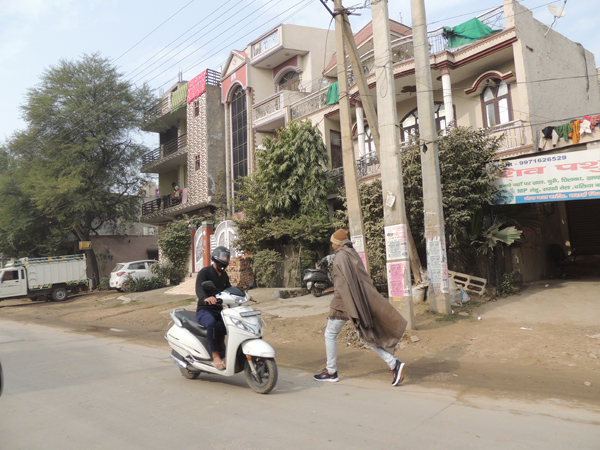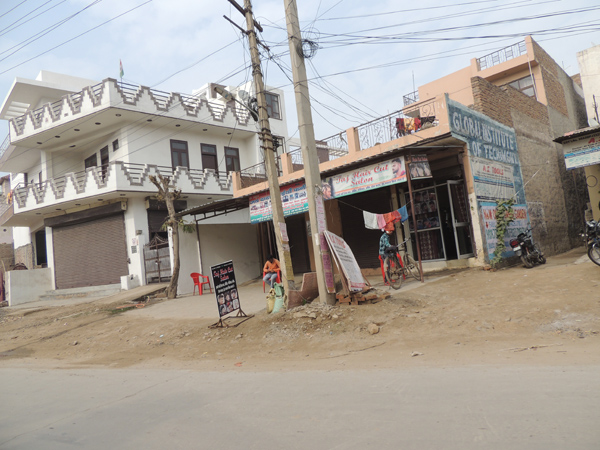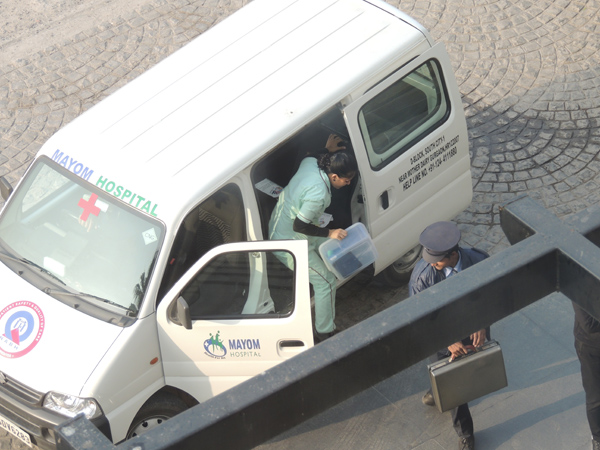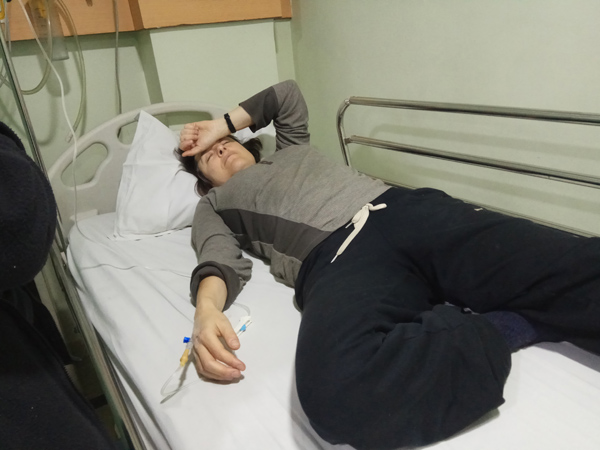|
|
|
pharmaceutical mixup in Gurugram
Saturday, December 21 2019
location: room 301, The Ferns Hotel, Gurugram, Haryana State, India
The Ferns may not have heated rooms, and it might be a struggle to get WiFi, but this morning they really delivered on the food. In coordination with Veg Voyages, they'd set out a buffet with plenty of vegan Indian-style options. Americans and Europeans prefer sweet, oily food for breakfast, so they might not've much liked the spread. But as someone who can't understand the concept of Western breakfast food (particularly the many things made from eggs), it was exactly what I wanted in breakfast. (Full disclosure: there were non-vegan options for the non-vegan guests, but these were easy to overlook given the savory bounty.) Since Gretchen and I hadn't actually hadn't had dinner last night and hadn't had a real meal since being on that long flight from JFK, it was great to have such a usable breakfast. I would end up eating two breakfasts: the first one early in the morning at around 7:00am and then another once Gretchen's parents met us down there at about 9:00am. Yes, this was to be yet another international family trip organized and funded by Gretchen's father. There would even be members of the former Pittsburgh clan (now residents of Fayetteville, Arkansas) in attendance, though that would be in a few days.
At breakfast, Gretchen's father happened to have a handful of European adapters in his vest ready to hand me when I said that, though I'd thought ahead to bring them, I'd ultimately failed to do so.
Meanwhile, Gretchen had also somehow failed to bring her two most important medications: an estrogen replacement regime to delay menopause (which she's taken since her hysterectomy over two years ago) and citalopram (aka "Celexa"), a serotonin reuptake inhibitor that she has taken for about 20 years to keep the darkness (her old friend) at bay. But Gretchen's father is a doctor, and he was able to write her a prescription for these things. Meanwhile, she'd done some research to find the nearest pharmacy, and found one a fifteen minute walk away.
When Gretchen returned with the drugs, she'd managed to find the estrogen okay, and, as for the citalopram, the pharmacist and found her something that he promised was an exact replacement, a drug called olanzapine. Accepting the pharmacist's direction that the drug was the same as citalopram, she bought the highest-dose pills available (10 mg) and took two of them, because her daily citalopram prescription is for 20 mg.
The afternoon's activity was to go watch birds at a place called Sultanpur National Park. We booked a driver and crammed all of into his small car, and off we went. I was finding driving around to be a sufficiently amusing activity that I didn't much mind that our driver went at least 20 minutes in the wrong direction before correcting his mistake and making a U-turn on the big highway we'd been on. Along the way, we marveled at the many things to see along the highway, particularly the dogs and cows, some of whom demonstrated expertise in using the roadways among the cars. They'd been living with humans in all their forms for so long that it came naturally to them. At one point we came upon a truck that had broken down in the road, causing a huge backup in the traffic. Unable to get his truck to move, the driver (or perhaps a mechanic) was under the truck right there in the roadway, turning nuts with a small spanner. You would never see such an indeterminate delay on an American road.
As we approached Sultanpur, Gretchen noticed that she was getting unusually sleepy, something she initially thought was the result of jet lag. But once it came time to get out of the car, she knew something was very wrong. All she wanted to do was lie down. There was no way she could be walking around looking at birds. Meanwhile, Gretchen's father was trying to find where he'd hidden his rupees. The distraction from the rupees hunt took our eyes momentarily off Gretchen, and when we next saw her she was lying in the orange dust of the Sultanpur parking area. She'd collapsed. I ran over to her, and she had no memory of having fallen. I helped her back to her feet and was guiding her back towards the car we'd come in when she suddenly collapsed again, and again she reported having no memory of falling. This time when I picked her up, I kept her up even though she went limp, and I managed to get her in the car. It took her a moment to recover conciousness. She briefly feared she might vomit, but the feeling faded.
As you might imagine, this scene attracted quite a crowd. Gretchen's parents had rushed over, as had a number of Sultanpur employees and various other locals, many of whom offered suggestions such as coffee or nearby medical services. Clearly something had gone amiss with Gretchen today, and the most obvious suspect was the medication she'd been provided at the pharmacy. What precisely was this olanzapine?
Despite the horror of having collapsed, Gretchen managed to stabilize and maintain consciousness once she was lying down. Obviously, the plan to watch birds was aborted, and we had the driver take us back to the hotel. Meanwhile Gretchen's father was searching his pack and his bag for his camera, but it was nowhere to be found. Evidently he'd lost at at Sultanpur in the chaos of Gretchen's ordeal in the parking lot. (He managed to call Sultanpur later, though the camera probably ended up with someone who will have difficulty affording the charger it will now require.)
Getting Gretchen up to the room wasn't easy, but there was plenty of help. We managed to get her to the elevator, where she lay down to recover before we walked her to the room. All that being vertical had her so nauseated that she nearly vomitted, but that feeling waned once she was lying in the bed.
It didn't take much research to learn that olanzapine is not a replacement for citalopram. It's not even in the same class of drugs. While olanzapine can be used to treat depression, it's more commonly used to treat schizophrenia and bipolar disorder. Instead of being a serotonin reuptake inhibitor, it's an atypical antipsychotic which acts by blocking serotonin (and dopamine) reception, which is very different from keeping serotonin from being reuptaken (and thus eliminated from body chemistry). There was no telling what the advised dose for olanzapine was, but it was likely that 20 mg was far too much. Still, it seemed like the sort of thing that would probably blow over with a little rest. It was the kind of risk I would've taken with myself in such a situation. But others were more risk averse.
On the strong advice of someone (and it wasn't actually any of us in Gretchen's family except perhaps her mother), a doctor was called. Doctors in India make actually housecalls, and eventually there one was, complete with a nurse, in our hotel room. After taking some of Gretchen's vital signs, he concluded that she needed to go to he doctor. At this point I remember thinking that the medical vortex was beginning to spiral out of control, seemingly out of proportion to the underlying medical issue. While it's true that tiny risks can be eliminated with intensive medical intervention, such intervention can also introduce new risks. There are, for example, lots of drug-resistant bacteria in hospitals, and this has become a particular problem in Indian hospitals.
There is a ratchet that works with increasing tiers of medicalization, and it works as follows: the next escalation is always offered as something small that won't take much time or trouble. But then it ends up being a bigger than promised and pushing inexorably towards the next stage of escalation. In this case, a somewhat low heart rate detected by the visiting doctor resulted in a car ride (via our usual driver) to the nearby Mayom hospital, where, Gretchen's father assured us, a litre or so of intravenous fluids would rapidly restore the vibrant, active Gretchen we all know and love.
The hospital was a bit dingy, but I've seen dingier even in the United States. More striking was how little human activity was happening within it. Where was the overflowing waiting room filled with wailing and the gnashing of teeth? It turned out that Mayom is a private hospital, and this accounted for orderly triage. I learned tonight that there are also public hospitals in India that are free, and those are the ones that first come to mind when thinking of hospitals in the third world. Gretchen ended up all by herself in a triage room with five or six beds. It was natural to want to be in that room with her, but the staff kept telling us (well, mostly me) to go wait our in the waiting area, where I was often the only non-employee. There was no WiFi connection, so I twiddled away the time seeing what various English words looked like in transliterated Hindi (using the Google Translate's app's offline translation feature). The only word I remember from doing this was "kutta," which means dog. In doing this, I was struck by how few obvious cognates there are between English and Hindi given that they likely were the same language about five thousand years ago.
There are few places as dull as a hospital waiting area, especially one with WiFi whose password is unknown. The audience of a local theatre's performance of Waiting For Godot is worse, but this comes close. As with the attendance of a play, the wait here in this waiting area had a finite timespan. In this case, the idea was that a litre of fluid would be put into Gretchen's arm, she'd totally recover, and we'd be heading back home in an hour and a half. But I was, as it happened, thinking too optimistically. I was failing to consider the inescapable pull of the medical vortex. Once Gretchen had received her litre, one of the nurses said that Gretchen's pulse rate was still too low and that the problem might be unrelated to the drugs she'd just overdosed on. To me, this was absurd, but, as I was learning, what I thought didn't really matter. A cardiologist was called and Gretchen began to receive another litre of fluid. It was looking like this crisis wasn't going to be over before dinner.
The cardiologist (well, that's what I thought he was, though he might've just been a higher eschalon of doctor) arrived with an authoritative flourish, flanked by other staffers. He was better dressed than the other doctors we'd seen, and he also spoke much better English. He quickly determined that Gretchen should spend the night at the hospital "for observation" because her condition had not stabilized sufficiently. He determined all this while I was still out in the waiting area and communicated this to Gretchen's parents without ever even calling me in (every time I'd gone into the triage room where Gretchen was, I'd always be told to go out to the waiting area). Perhaps this was a cultural thing and it was assumed that the parents of an ill patient should have more say so about her welfare than the husband. Eventually, though, I went back into the triage room in time to catch the cardiologist's recommendations. I tried to shut them down by saying (in a fairly stern voice) that this were merely the cardiologist's advice and that we should take Gretchen back to the hotel immediately. At this point the cardiologist agreed that we could take her, but that then the hotel would have responsibility for her condition and that additional forms would have to be filled out. He was probably trying to snow us, and though it wasn't working on me, it was working on Gretchen's parents. And I couldn't really argue with them, since they were the reason we were in India to begin with. My utter defeat was sealed by one of the low-level functionaries telling me, yet again, that I was supposed to wait out in the waiting area.
I sat out there for a time, feeling powerless and emasculated. Eventually Gretchen's mother joined me, and I told her that Gretchen's case was being "over-medicalized," a phenomenon both Gretchen and I have had negative experiences with in the past and that we do our best to avoid. Gretchen's mother's response was that, though low, there was a risk of something bad happening should Gretchen not be closely observed overnight. My response was that those risks were small and that staying overnight in a hospital has its own risks: the risk of unnecessary interventions or of coming into contact with drug-resistant superbugs. At this point I was so angry at Gretchen's parents that I couldn't even look at my mother-in-law as I talked to her. Before long, though, I'd given in fatalistically to what was happening. Gretchen's father handled all the forms (and there were lots of them) and I resigned myself to spending the night with Gretchen in the room she would be getting. It was to be a "deluxe" private room, and there would even be WiFi.
The process of moving Gretchen to her private room on the second floor involved four or five employees, demonstrating how well-staffed this particular hospital was. As they swarmed her, moving her to her new bed, reattaching the fluid drip and hooking her up to a monitoring device, she was only moderately conscious.
I returned to the hotel with Gretchen's parents and ate a quick dinner with them in the same area where we'd had breakfast (it turned out that it was a full-service restaurant, though the buffet included a reasonable selection of vegan food, all of it Indian. I sat with a couple people who would be part of our Veg Voyages excursion. This included Kirstin, whom Gretchen and I had met earlier, and Vickie, an Australian living in Japan. Since I was convinced Gretchen wasn't in bad enough shape to be spending the night in the hospital, it was fairly easy for me to convincingly reassure these concerned strangers that Gretchen would be just fine.
On their way to the airport to pick up more Veg Voyages, one of the Indian fixers and his driver dropped me off at Mayom Hospital. Gretchen was fast asleep in her room, so there wasn't much for me to do but open my laptop, get on the internet, and do what I usually do. Naturally, the paper that the WiFi password had been written on was in my father-in-law's pocket back at the hotel, and I couldn't communicate with him without internet, so I had to have the hospital staff track the password down for me. Someone tried to read it to me over the phone, but there was no way I was going to receive it correctly given the strength of the accent being used to pronounce the password's components. So I handed the phone to a hospital employee who was in the room with me and asked him to transcribe.
And then I was alone in the hospital room with my soundly-sleeping wife and the incessant beeping of the monitoring device. Beep Beep Beep Beep Beep BeepBeepBeep! It did that over and over all night at the volume of a loud speaking voice. Nothing could be done to silence it, and it was completely unnecessary since the nurse assigned to monitor it was down the hall, too far away to actually hear it. The actual monitoring that Gretchen needed to be in the hospital to receive was done by a nurse coming in every hour to read the device and also take a number of manual measurements (such as blood pressure). It was as if the monitor's beeping had been designed as a kind of aural Chinese water torture. To keep from losing my mind, I stuffed wads of wet toilet paper in my ears. I even tried to put a pad of toilet paper over the grating protecting the device's piezoelectric speaker, but I had nothing available to secure it except a film of water, and I didn't want to create an international incident. Had I remembered to bring my headphones, I could've been listening to music or watching YouTube videos, and I would've been much happier.
I had remembered to bring 100 mL of 80 proof vodka, and drinking that definitely helped smooth over the discomforts. In this state, I spent several hours writing the account for the earlier part of this trip in my online journal. As for Gretchen, the continued effects of the olanzapine made her mostly unaware of the beeping monitor. Occasionally, though, she'd develop enough consciousness to ask about it and whether anything could be done to silence it, oblivious to the fact that she'd asked the same questions a couple hours before.
I should mention that the hospital room had that somewhat run-down quality that everything in India has. And things that weren't obviously run-down were just weird, such as the toilet in the bathroom, which could be successfully flushed without ever dislodging a turd adhering the side of the bowl (this forced me to grab an available bucket to flush it that way). There was a low couch along one wall that had a small fitted mattress over it, evidently provided for people such as me to sleep on. But it was right next to the speaker grill of the monitoring device, meaning the beeping was actually loudest precisely in the place provided for a healthy visitor to sleep. Still, if I wanted to have any sort of vacation I was going to need to get some sort of sleep. Masturbation helps in a situation like this, and I was in the mood for porn. But it turns out that India filters its internet to block most of the porn one is likely to find in a Google search. I don't know why they even bother, though, because it doesn't take much extra effort to visit a porn URL using a web proxy.

Street scene in Gurugram.

Another street scene in Gurugram.

The housecall doctors arrive at The Fern.

The scene in the waiting room at

Gretchen in the hospital. She will probably be mad if she finds out I posted this picture.
For linking purposes this article's URL is:
http://asecular.com/blog.php?191221 feedback
previous | next |




